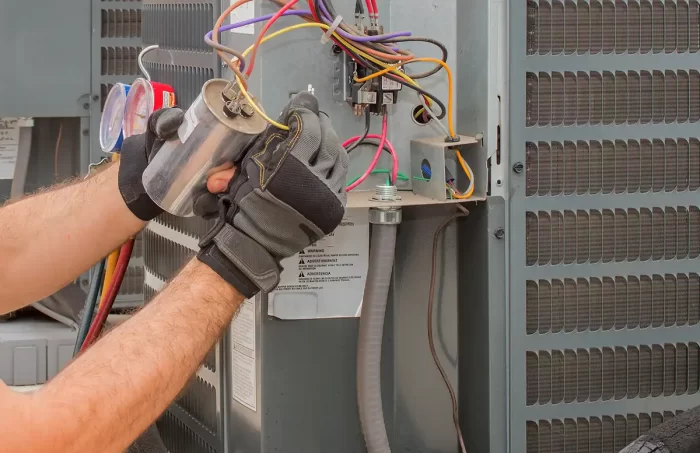My AC Unit Buzzing and the Fan is Not Spinning?
If your air conditioner is not working, check the fan on the outside unit. If it’s buzzing, but the fan is not spinning, you may have one of two issues.
First, If the fan on your outside unit is not spinning, do a visual inspection to ensure it is not jammed. If there is an exceptional amount of dirt or debris around the fan axle it may not be able to move. Cleaning the unit, or removing debris may fix the issue. Do not attempt to open the unit or insert objects into th fan unless you are qualified to do so. The AC fan and internal components can be very dangerous.
If your fan looks clean and moves freely, you may have a bad capacitor. This is a very common AC problem. It is not difficult to fix, but most homeowners hire a professional for this task.
What does an AC capacitor do?
A capacitor is a small, cylindrical object that stores energy—similar to a battery. Capacitors send an electrical jolt to start a motor (a “start capacitor”) or to keep one running (a “run capacitor.”) In an air conditioning system, capacitors work with three different motors: the compressor, the indoor blower fan, and outdoor fan.
It takes much more energy to get the outdoor fan going than it does to keep it running. It needs that extra boost from a start capacitor. So, if the capacitor attached to your fan motor is bad, the fan won’t start spinning.

Can I replace the capacitor myself?
It’s possible, but not recommended unless you already have experience working with the electrical components of your AC unit. The replacement process involves dealing with high voltage, and there is a risk for serious or even deadly electric shock if not done safely and properly.
The power to the AC unit must be shut down before opening the service panel, and the capacitor itself discharged of stored energy before it can be removed. Otherwise, touching two capacitor terminals at the same time will cause an electric shock. Disposing of a capacitor that hasn’t been discharged can even cause a fire.
After the bad capacitor has been safely removed, replacement is a matter of selecting the right replacement and attaching the wires correctly.
What causes a capacitor to fail?
Like batteries, capacitors lose the ability to hold a charge over time. They can also suffer damage from high temperatures or high voltage. Scorching outdoor temps plus the heat of the motor can overwhelm a capacitor and cause it to fail. Scheduled maintenance can help spot potential capacitor issues before they fail.
In the Wichita area, give us a call at (316) 462-2572 for help with your AC problems.
We do our best to provide current and accurate information, but this content could contain errors or information that is not correct for your situation or equipment. Resources found on our website are provided as general information. Reddi Industries does not assume any liability resulting from the provided information. If you attempt to repair or modify HVAC, plumbing, electrical, or other equipment in your home or business, always consult your equipment’s operating manual first, and only do so if you are qualified.
